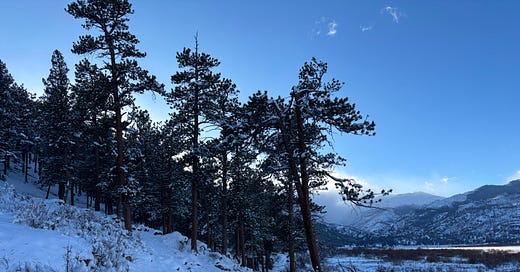by
I notice the sacred silence as I step into the January forest. All year, the woods have been vibrantly alive—a rich symphony of sound, color, and movement. But in winter, life sings a much slower tune. The chorus of frogs, insects, and birds has fallen silent. The roaming wind barely whispers through the barren treetops. A twitter from the little juncos or “snowbirds” and the mournful moan of an owl occasionally break through the stillness. The world is washed in neutral hues: the beige of withered grass, the stark ashen gray of leafless trunks, and the rusty brown of fallen leaves. Even the sunlight seems weak and watery as if all creation has forgotten the years of life, birth, and beauty.
I feel a quiet ache when I walk through the winter woods. My fondest memories from hikes taken during this season involve moments of transcendent stillness. I’ve watched the golden perfection of the full moon rise above tangled birch branches. I’ve enjoyed “conversations” with talkative barred owls during velvet dusk. I’ve run homeward through the fallen leaves, with a slow-burning sunset simmering on the horizon, the first shy stars peeking above me, and my breath swirling wild in the ice-born air.
These are moments of indefinable stillness, moments when the world's heartbeat thrums slow, and all that rejoices, dances, laughs, and labors under the summer skies drowses in the piles of dead leaves.
Yes, the winter woods sing a slower cadence, and because of this, there’s a sadness in the air—a faint taste of melancholy, elusive and uncertain. I have a hard time seeing the crispy leaves, the bereaved trees, and the barren hillsides without feeling a twinge of regret for summer’s lost vibrancy.
Yet I love the winter woods, even when they seem most inhospitable. When I shuffle through last autumn’s papery leaves, when I glimpse the deer in their muted winter coats, when I marvel at the silence of ice-encrusted streams and the subdued twittering of lonely chickadees, I am enjoying a commodity that is both rare and mundane, prized and abhorred—quiet.
Our society has a bizarrely paradoxical relationship with silence. Many speak of its merits, claiming its benefits for health, concentration, and sanity. Some even go so far as to attend seminars or conferences on applying the principles of silence spiritually.
While silence may be respected and admired, it is not always enjoyed. Consider how little space we often leave for quiet in our daily lives. Most of us feel more comfortable surrounding ourselves with more stimuli—television shows, radios, Bluetooth devices, and even “white noise” machines.
So, while it’s popular to preach the advantages of quiet, many prefer to theorize rather than experience. Quiet has a strange way of dismantling our defenses and laying bare the hidden desires of our hearts.
However, the voice of God is often most audible in the holiness of hush.
Why would the Creator and Sustainer of all things choose this humble way of speaking to us?
Sometimes, the only way God can get our attention is through silence. So many noises vie for our scattered focus. Our cell phones alone assault us with a ridiculous number of notifications every day, even if we systematically disable this function for most apps and programs.
Even in the spiritual realm, we face the distracting “noise” of fear, doubt, worry, regret, guilt, and uncertainty. Just as a silent pause in a darkened theater cues the crowd for what is to come, God sometimes uses quiet to redirect our focus to Him and make us hungry for His Presence.
Once God has our attention, He can use quiet as His avenue of compassion. When we are hurting, or our world has been clawed to irreparable shreds, the last thing we need is for God to impress us. We need Him to embrace us–to sit with us in our pain, hold us with gentle hands, and hug us close to His heart.
And when we heed that still voice of God, the true beauty of quiet begins to blossom because quiet is necessary for growth.
In our culture, quiet is viewed as an indicator that nothing is happening. However, some of the most abundant periods of growth in our lives happen not during the bright and sunshiny times but during the long, agonizing stretches of silence.
God reveals this truth vividly when He blankets the forest with winter’s silence. During these dim and quiet days, the sap circulates in the trees. Like patient reminders that spring is coming, leaf buds perch on the deadened branches. Most of the season's offspring, like speckled fawns, are still developing inside their pregnant mothers. And all this growth—the child of the silence—makes the miracle of spring possible.
This, then, is the hope we find in the winter woods. Many of us are taught or conditioned to view silence as a frightening void or even a disgrace—a sign of being abandoned or defeated. Silence is often distorted to mean that we are not doing enough or that our lives are stagnating. Some of us even interpret God’s silence as a sign that He is ignoring us and has turned His attention to more deserving children. Yet in the Creator’s world, quiet is the lullaby sung lovingly to the growing earth, the wellspring from which the succession of other seasons flows.
Yes, the winter woods look barren. And at times, so do our lives. But when we are caught in moments of silence, we can trust that God has not forsaken us. His eye does not leave us for one moment. In every season of quiet, we can embrace God’s nearness, enjoy His gentleness, heed His voice, and expect Him to tend our souls toward growth in the holiness of hush.
The quiet is not deadening—it is quickening. So we can smile in the silence—and when we hear that still small voice, we can be ready to respond, “Speak, for Your servant is listening” (1 Samuel 3:10 NASB).
A worshiper of the Creator and a wanderer of creation, Ashlyn McKayla Ohm is the author of the contemporary fiction Climbing Higher trilogy as well as devotional and poetry collections. When she's not getting lost in the woods, she can follow her writing on her Substack,
.







I'm so honored to have had the opportunity for my writing to be featured! Thank you!
This is so good. Our small group is studying the practice of Solitude this month (using the Rule of Life/Practicing the way series by John Mark Comer). These thoughts and truths you’ve so beautifully written fit so nicely with our study.